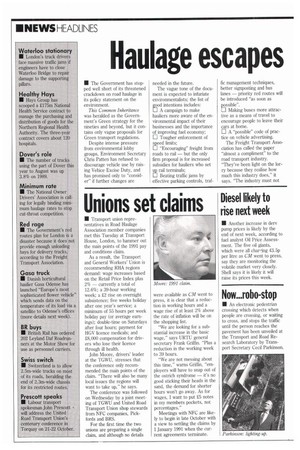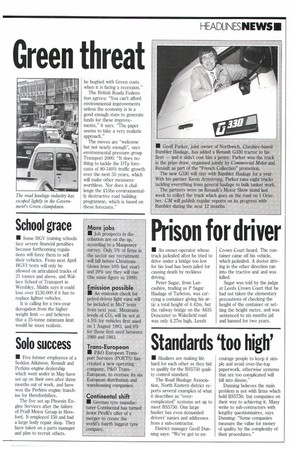aulage escapes Green threat
Page 6

Page 7

If you've noticed an error in this article please click here to report it so we can fix it.
• The Government has stopped well short of its threatened crackdown on road haulage in its policy statement on the environment.
This Common Inheritance was heralded as the Government's Green strategy for the nineties and beyond, but it contains only vague proposals for Green transport regulations.
Despite intense pressure from environmental lobby groups, Environment Secretary Chris Patten has refused to discourage vehicle use by raising Vehice Excise Duty, and has promised only to "consider" if further changes are needed in the future.
The vague tone of the document is expected to infuriate environmentalists; the list of g.00d intentions includes: UI A campaign to make hauliers more aware of the environmental impact of their businesses and the importance of improving fuel economy; 0 Tougher enforcement of speed limits;
LJ "Encouraging" freight from roads to rail — but the only firm proposal is for increased subsidies for hauliers who set IN rail terminals;
LJ Beating traffic jams by effective parking controls, traf fic management techniques, better signposting and bus lanes — priority red routes will be introduced "as soon as possible".
LJ Making buses more attractive as a means of travel to encourage people to leave their cars at home.
0 A "possible" code of practice on vehicle advertising.
The Freight Transport Association has called the paper "almost a compliment" to the road transport industry. "They've been light on the lorry because they realise how much this industry does," it . "The industry must not be hogtied with Green costs when it is facing a recession."
The British Roads Federation agrees: "You can't afford environmental improvements unless the economy is in a good enough state to generate funds for these improvements," it says. "The paper seems to take a very realistic approach."
The moves are "welcome but not nearly enough", says environmental pressure group Transport 2000: "It does nothing to tackle the DIp forecasts of 80-140% traffic growth over the next 35 years, which will make other measures worthless. Nor does it challenge the £15bn environmentally destructive road building programme, which is based on these forecasts."
































































































